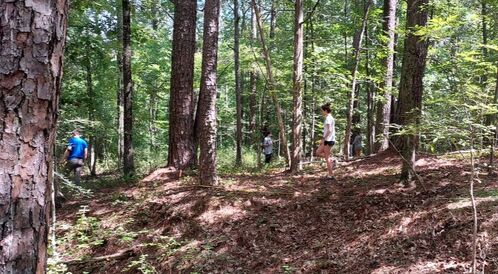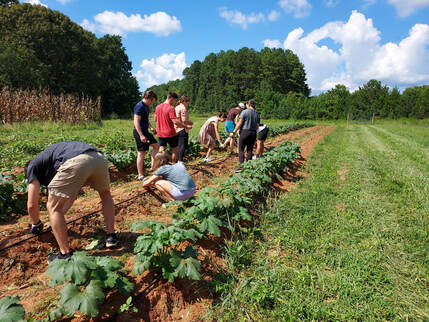Davidson College

Ecology (Fall 2022)
In this course, students investigate the dynamic interactions between biotic and abiotic factors in natural and managed ecosystems by carrying out investigative and independent field experiments and diving into the scientific literature on cutting-edge topics from disease ecology to urban ecology.
In this course, students investigate the dynamic interactions between biotic and abiotic factors in natural and managed ecosystems by carrying out investigative and independent field experiments and diving into the scientific literature on cutting-edge topics from disease ecology to urban ecology.

Agroecology in a Changing World (Fall 2022)
In this seminar, students investigate the ecology and evolution of organisms in agricultural systems and examine sustainable agricultural practices through a combination of hands-on experiences at the Davidson Farm, field trips to local organic farms, and discussion of the scientific literature. Students apply their knowledge to address current problems faced by local farmers and design resilient farming systems.
In this seminar, students investigate the ecology and evolution of organisms in agricultural systems and examine sustainable agricultural practices through a combination of hands-on experiences at the Davidson Farm, field trips to local organic farms, and discussion of the scientific literature. Students apply their knowledge to address current problems faced by local farmers and design resilient farming systems.
- Syllabus
Biostatistics for Life Scientists (Fall 2021)
This hands-on course introduces science majors to experimental design, probability, descriptive and inferential statistics, and the R programming language for biological research. Each class, students complete activities in R analyzing real datasets in pairs. For their final project, students design a research question, analyze an open-access dataset of their choice in R, and present an infographic of their results to the class.
This hands-on course introduces science majors to experimental design, probability, descriptive and inferential statistics, and the R programming language for biological research. Each class, students complete activities in R analyzing real datasets in pairs. For their final project, students design a research question, analyze an open-access dataset of their choice in R, and present an infographic of their results to the class.
Integrated Concepts in Biology II (Spring 2022)
This course introduces students to biology’s core concepts from organisms through ecological systems including information, evolution, cells, emergent properties, and homeostasis. Classes focus on students constructing their own knowledge of core biological concepts through investigating case studies in group activities. Weekly labs emphasize the process of science and data interpretation through authentic research experiences. Specifically, students design and carry out four hypothesis-driven, independent research projects in groups, from investigating protozoan population ecology to analyzing climate change-mediated changes in species distributions using large, open-source datasets (via Global Biodiversity Information Facility; GBIF).
This course introduces students to biology’s core concepts from organisms through ecological systems including information, evolution, cells, emergent properties, and homeostasis. Classes focus on students constructing their own knowledge of core biological concepts through investigating case studies in group activities. Weekly labs emphasize the process of science and data interpretation through authentic research experiences. Specifically, students design and carry out four hypothesis-driven, independent research projects in groups, from investigating protozoan population ecology to analyzing climate change-mediated changes in species distributions using large, open-source datasets (via Global Biodiversity Information Facility; GBIF).
University of Georgia |
Insects and the Environment (Fall 2020, Spring 2021)
In this synchronous online course, I engaged non-majors with core concepts in ecology and evolution by exploring insect biology, insect ecology, and human-insect interactions. Students investigated the diversity of insects in their personal lives by creating virtual insect collections, which they uploaded to iNaturalist. In addition, students wrote popular science articles on entomology-related topics important to them, from insects in the Bible to insect-vectored diseases.
In this synchronous online course, I engaged non-majors with core concepts in ecology and evolution by exploring insect biology, insect ecology, and human-insect interactions. Students investigated the diversity of insects in their personal lives by creating virtual insect collections, which they uploaded to iNaturalist. In addition, students wrote popular science articles on entomology-related topics important to them, from insects in the Bible to insect-vectored diseases.
